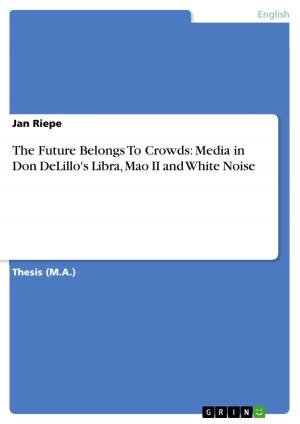| Author: | Barbara Lier | ISBN: | 9783638118279 |
| Publisher: | GRIN Publishing | Publication: | March 31, 2002 |
| Imprint: | GRIN Publishing | Language: | English |
| Author: | Barbara Lier |
| ISBN: | 9783638118279 |
| Publisher: | GRIN Publishing |
| Publication: | March 31, 2002 |
| Imprint: | GRIN Publishing |
| Language: | English |
Seminar paper from the year 1998 in the subject American Studies - Literature, grade: Good, University of Bonn (American-English Institute), course: Proseminar: Slavery & American Culture- History and Literature, 12 entries in the bibliography, language: English, abstract: INTRODUCTION 'Benito Cereno' has been certified by one learned commentator as one of Herman Melville's 'most superb achievements' 1, and it would seem that this judgement is well made. Simultaneously an exercise in ensnaring the reader in a tangled web of intrigue and a biting satire on the all too prevelant 'passive' (and even 'benign') racism of his time, the author uses one character above all others in this narrative to achieve his ends: the skipper of the 'Bachelor's Delight,' Captain Amasa Delano. The story is, for the most part, narrated via Captain Delano, and, although the question of 'multi-perspective narrative,' as one commentator has termed it, could pose one or two interesting problems, it seems reasonable to assume here that much - if not all - of the association of events in the story and the plentiful imagery and reference to symbolic figures occurs in Delano's own mind. Indeed, excluding - obviously - Benito Cereno's own deposition, Delano's is the only clear-cut point of view the reader is offered, and thus it would seem difficult to argue that we can see any more than the American Captain; although, crucially, we are able to 'notice' more than he does. In other words, we are compelled to see through Delano's eyes, though we need not necessarily agree with the associational processes of his mind. Furthermore, it is often the case that, throughout the story, we find ourselves at odds with the American's conjectures - we do not travel with him during his occasional journies into the depths of paranoia, nor do we share his frequently blithe optimism. In short, even before the true state of affairs is made clear to us in the denouement, we do not trust Delano's view of events aboard the 'San Dominick.' [...]
Seminar paper from the year 1998 in the subject American Studies - Literature, grade: Good, University of Bonn (American-English Institute), course: Proseminar: Slavery & American Culture- History and Literature, 12 entries in the bibliography, language: English, abstract: INTRODUCTION 'Benito Cereno' has been certified by one learned commentator as one of Herman Melville's 'most superb achievements' 1, and it would seem that this judgement is well made. Simultaneously an exercise in ensnaring the reader in a tangled web of intrigue and a biting satire on the all too prevelant 'passive' (and even 'benign') racism of his time, the author uses one character above all others in this narrative to achieve his ends: the skipper of the 'Bachelor's Delight,' Captain Amasa Delano. The story is, for the most part, narrated via Captain Delano, and, although the question of 'multi-perspective narrative,' as one commentator has termed it, could pose one or two interesting problems, it seems reasonable to assume here that much - if not all - of the association of events in the story and the plentiful imagery and reference to symbolic figures occurs in Delano's own mind. Indeed, excluding - obviously - Benito Cereno's own deposition, Delano's is the only clear-cut point of view the reader is offered, and thus it would seem difficult to argue that we can see any more than the American Captain; although, crucially, we are able to 'notice' more than he does. In other words, we are compelled to see through Delano's eyes, though we need not necessarily agree with the associational processes of his mind. Furthermore, it is often the case that, throughout the story, we find ourselves at odds with the American's conjectures - we do not travel with him during his occasional journies into the depths of paranoia, nor do we share his frequently blithe optimism. In short, even before the true state of affairs is made clear to us in the denouement, we do not trust Delano's view of events aboard the 'San Dominick.' [...]















